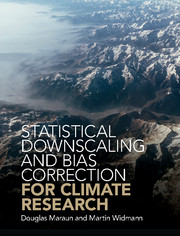Book contents
- Frontmatter
- Dedication
- Contents
- Preface
- Acknowledgements
- 1 Introduction
- Part I Background and Fundamentals
- 2 Regional Climate
- 3 History of Downscaling
- 4 Rationale of Downscaling
- 5 User Needs
- 6 Mathematical and Statistical Methods
- 7 Reference Observations
- 8 Climate Modelling
- 9 Uncertainties
- Part II Statistical Downscaling Concepts and Methods
- Part III Downscaling in Practice and Outlook
- Appendix A Methods Used in This Book
- Appendix B Useful Resources
- References
- Index
5 - User Needs
from Part I - Background and Fundamentals
Published online by Cambridge University Press: 27 December 2017
- Frontmatter
- Dedication
- Contents
- Preface
- Acknowledgements
- 1 Introduction
- Part I Background and Fundamentals
- 2 Regional Climate
- 3 History of Downscaling
- 4 Rationale of Downscaling
- 5 User Needs
- 6 Mathematical and Statistical Methods
- 7 Reference Observations
- 8 Climate Modelling
- 9 Uncertainties
- Part II Statistical Downscaling Concepts and Methods
- Part III Downscaling in Practice and Outlook
- Appendix A Methods Used in This Book
- Appendix B Useful Resources
- References
- Index
Summary
Regional climate modelling might be purely discovery driven. Often, however, it is funded and designed to supply users with information. In this chapter, we will lay out the needs of different users in the broader context of climate change adaptation.
Context
The VALUE network (Maraun et al. 2015) has carried out a survey on requirements by users of regional climate change data (Roessler et al. 2017). Information on temperature, precipitation, wind speed, relative humidity and global radiation are demanded by more than 50% of the surveyed users (which were dominated by impact modellers from the water sector). Around 40% demand fields of data at a spatial resolution of 1km or finer, about one third at an hourly temporal resolution, and another 50% at daily resolution. Often users essentially demand “future observations”. As will become clear from the discussions throughout this book, robust information at such a high resolution in both space and time can in general not be provided in the form of time series.
In recent years, however, users are in practice often additionally confronted with a very different problem, which Barsugli et al. (2013) coined the practitioner's dilemma: web-based portals now provide access to a proliferation of high-resolution climate projections. These products are based on different methods and assumptions and often provide contradictory results (Hewitson et al. 2014), but users do not have guidance to select appropriate data sets and use them wisely. According to Barsugli et al. (2013, p. 424), “products are sometimes selected on the basis of availability, convenience of format, and familiarity with the provider.” Obviously, there is a huge discrepancy between the expressed user needs and the actual choice of data.
At the interface between providers and users of regional climate information, also a provider's dilemma exists: demands by national and local governments, climate services providers, development banks or international aid organisations pressure the scientific community to operationalise the provision of regional climate projections – but, as will be discussed throughout this book, the science required to provide such information is still foundational research (Hewitson et al. 2014). In this context, scientists face questions about their responsibilities when delivering uncertain information which may be used for real-world decisions.
- Type
- Chapter
- Information
- Publisher: Cambridge University PressPrint publication year: 2018
- 1
- Cited by



